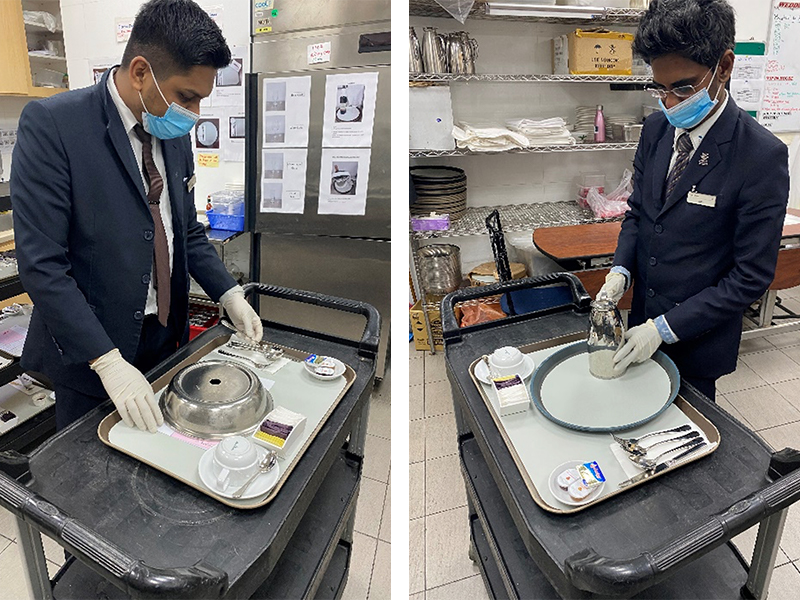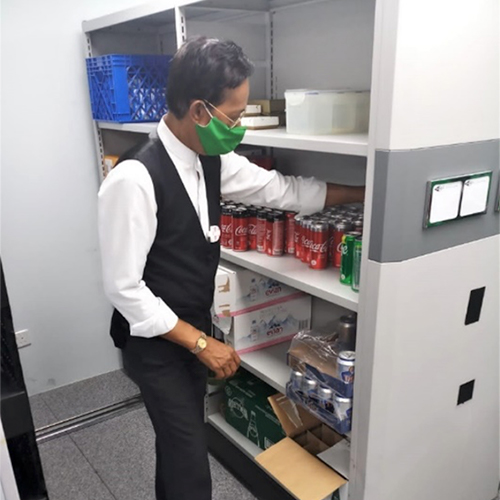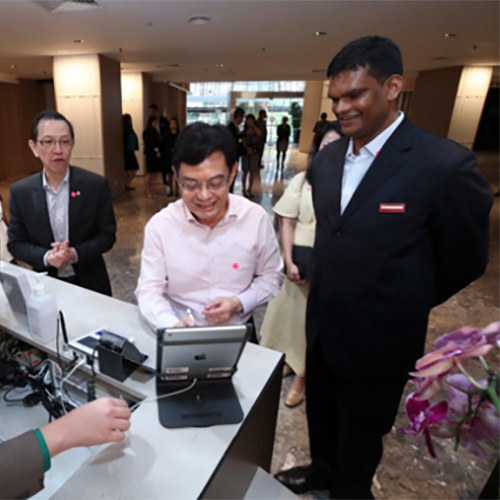The topic of upskilling has been in the spotlight lately, with many people recognising the importance of continuous learning. Picking up new skills, no matter at which stage of one’s career, helps one stay relevant in the workplace. With Job Redesign, not only can companies benefit from increased productivity through job enlargement and job enrichment, employees are also upskilled to stay relevant and employable.
Recently, Carlton Hotel participated in the Hotel Job Redesign Reskilling Programme to create a win-win situation for both the hotel and the employees. Two roles, the Security (House) Officers and the Room Service staff, were cross-trained to form a centralised Security & Service team.
As both the security and room service roles comprise of regular movements within the premises, Job Redesign sought to capitalise on the similar nature of both roles to expose staff to the other area of work. By doing so, the hotel would be able to further develop employees, enhance job satisfaction as well as increase functional efficiency for better guest experiences.
The Security Officers were trained to fulfil room service duties under the guidance of experienced staff from the Room Service team through on-the-job training (OJT). The new skills learnt would enable Security Officers to carry out room service in addition to their usual security patrolling and site inspections. Similarly, the Room Service staff were trained to patrol and perform basic fire safety and equipment checks, the tasks that do not require mandatory security certificate. Upon completion of training, trained employees will be placed in a centralised pool and be rostered to either function on a rotational basis as part of their regular job scope.

In Pictures: Naufal (left) and Jens (right) learning to prepare cutleries and sort them based on the type of food served.
This job enlargement has allowed Carlton Hotel to exercise flexibility in efficient deployment of manpower to meet its daily security and room services’ needs. For example, having been trained in food safety and certified for WSQ Food Hygiene Course, the Security Officers will be able to take on room service duties while on night shifts. This reduces at least one Room Service staff during a non-peak night.
With Job Redesign, the hotel gained more multi-skilled employees, hopefully it can reduce headcount and increase productivity. From the employee’s point view, it can achieve more skills from their primary role and better employability in future. Shah bin Sulaimi and Naufal bin Abdul Jalil used to be Security (House) Officers. They underwent reskilling to form the new centralised Security & Service team. Let us find out what they thought about the Job Redesign process.
Interviews have been edited for clarity.
1. What were your first thoughts upon learning about Job Redesign (JR) and why do you think it is important?
Shah/ Naufal: Carlton Hotel has been appointed as a designated Stay-Home Notice (SHN) hotel since June 2020. Room service has thus become even more important, since SHN guests are not allowed to leave their rooms. Room Service staff are required to be on standby 24/7, readily available to attend to guest’s requests.
During unprecedented times like this when the hotel receives fewer travellers than usual, business revenue from SHN guests and staycation guests are essential in keeping the hotel’s business running. On the other hand, the hotel will also have to keep their operations and wage costs low; thus, we are happy to perform multitask to meet hotel’s goals.
2. Was there anything about the transition/learning process which was particularly memorable/enjoyable/useful for you?
Shah / Naufal: The room service duties are added job responsibilities for Security Officers working on the night shift. It is crucial to know how to prioritise and manage the two tasks. We will set the safety and security task as our top priority should there be a call for both.
The memorable part about this new redesigned role is to see satisfied / happy guests when we provide good service as they feel safe and well taken care of. This has helped to increase the quality of our customer service standards.
Additionally, getting certified for WSQ Food Hygiene Course is a useful and transferrable skill if we were to move into F&B line in future.
3. How different are your new roles and responsibilities, and did you face any challenges while adapting to them / during the transition period?
Shah / Naufal: The challenge is when there is a large number of guest checking-ins, and both security and room service duties are required. If need be, we will engage help from other duty personnel aims to ensure no lapse in service delivery.
4. Was job redesign useful to you? In what way?
Shah / Naufal: Job Redesign is definitely a better way for us to learn new skills and work with more people; and at the same time, we get to understand and appreciate our colleagues in the other roles better.
5. Share with us some new skills that you have picked up and how are you applying them in your redesigned role.
Shah / Naufal: We have picked up new skills such as taking orders, preparing cutleries and sorting them based on the type of food served; followed by picking up ready food, delivering to the guest rooms and collecting back the used utensils. We also learnt how to use the ‘KNOWCROSS’ software application and operate the coffee machine.
6. Do you think this initiative was useful to the company? In what way?
Shah / Naufal: Yes, Job Redesign has been beneficial to the hotel. During unprecedented times like this, it is important for existing employees to add value to our jobs and helping hotel to reduce operating costs.
7. What advice would you give to fellow colleagues in the hotel sector who are undergoing the Jobs Redesign training as well?
Shah / Naufal: Be adaptable to changes and be open-minded to learning new skills.




